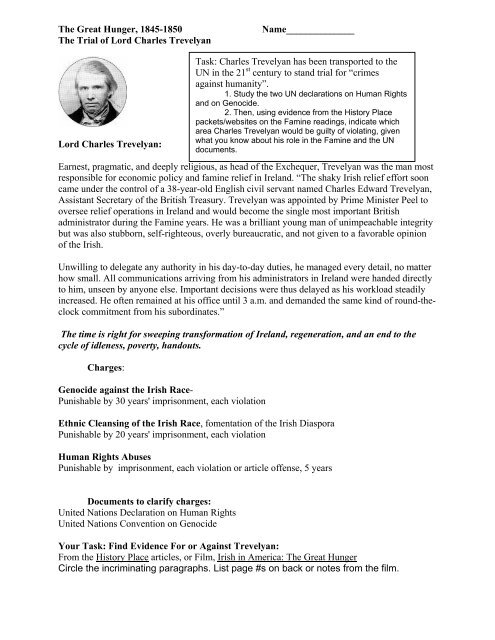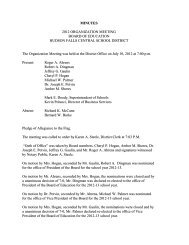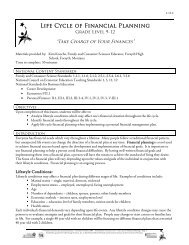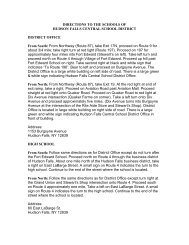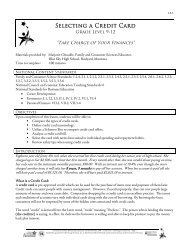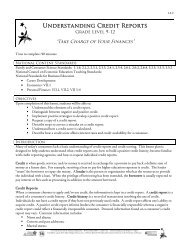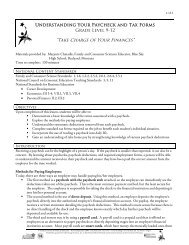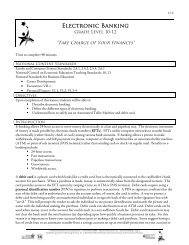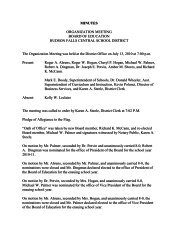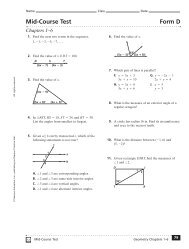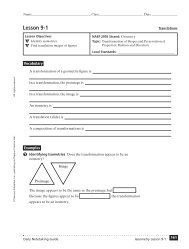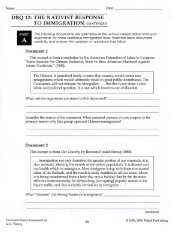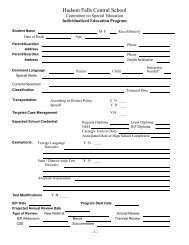The Trial of Lord Charles Trevelyan - HFCSD Home
The Trial of Lord Charles Trevelyan - HFCSD Home
The Trial of Lord Charles Trevelyan - HFCSD Home
Create successful ePaper yourself
Turn your PDF publications into a flip-book with our unique Google optimized e-Paper software.
<strong>The</strong> Great Hunger, 1845-1850<strong>The</strong> <strong>Trial</strong> <strong>of</strong> <strong>Lord</strong> <strong>Charles</strong> <strong>Trevelyan</strong>Name______________<strong>Lord</strong> <strong>Charles</strong> <strong>Trevelyan</strong>:Task: <strong>Charles</strong> <strong>Trevelyan</strong> has been transported to theUN in the 21 st century to stand trial for “crimesagainst humanity”.1. Study the two UN declarations on Human Rightsand on Genocide.2. <strong>The</strong>n, using evidence from the History Placepackets/websites on the Famine readings, indicate whicharea <strong>Charles</strong> <strong>Trevelyan</strong> would be guilty <strong>of</strong> violating, givenwhat you know about his role in the Famine and the UNdocuments.Earnest, pragmatic, and deeply religious, as head <strong>of</strong> the Exchequer, <strong>Trevelyan</strong> was the man mostresponsible for economic policy and famine relief in Ireland. “<strong>The</strong> shaky Irish relief effort sooncame under the control <strong>of</strong> a 38-year-old English civil servant named <strong>Charles</strong> Edward <strong>Trevelyan</strong>,Assistant Secretary <strong>of</strong> the British Treasury. <strong>Trevelyan</strong> was appointed by Prime Minister Peel tooversee relief operations in Ireland and would become the single most important Britishadministrator during the Famine years. He was a brilliant young man <strong>of</strong> unimpeachable integritybut was also stubborn, self-righteous, overly bureaucratic, and not given to a favorable opinion<strong>of</strong> the Irish.Unwilling to delegate any authority in his day-to-day duties, he managed every detail, no matterhow small. All communications arriving from his administrators in Ireland were handed directlyto him, unseen by anyone else. Important decisions were thus delayed as his workload steadilyincreased. He <strong>of</strong>ten remained at his <strong>of</strong>fice until 3 a.m. and demanded the same kind <strong>of</strong> round-theclockcommitment from his subordinates.”<strong>The</strong> time is right for sweeping transformation <strong>of</strong> Ireland, regeneration, and an end to thecycle <strong>of</strong> idleness, poverty, handouts.Charges:Genocide against the Irish Race-Punishable by 30 years' imprisonment, each violationEthnic Cleansing <strong>of</strong> the Irish Race, fomentation <strong>of</strong> the Irish DiasporaPunishable by 20 years' imprisonment, each violationHuman Rights AbusesPunishable by imprisonment, each violation or article <strong>of</strong>fense, 5 yearsDocuments to clarify charges:United Nations Declaration on Human RightsUnited Nations Convention on GenocideYour Task: Find Evidence For or Against <strong>Trevelyan</strong>:From the History Place articles, or Film, Irish in America: <strong>The</strong> Great HungerCircle the incriminating paragraphs. List page #s on back or notes from the film.
Jury discussion/tally sheet: Human Rights AbusesPunishable by imprisonment, each violation or article <strong>of</strong>fense, 5 yearsHuman Rights Abuse Violation(s):ARTICLE #ARTICLE 1ARTICLE 2ARTICLE 3ARTICLE 4ARTICLE 5ARTICLE 6ARTICLE 7ARTICLE 9ARTICLE 12ARTICLE 13ARTICLE 17ARTICLE 18ARTICLE 19ARTICLE 20ARTICLE 21ARTICLE 23ARTICLE 25ARTICLE 26ARTICLE 27CHECK HERE IF GUILTYOF VIOLATIONSPECIFIC EVIDENCE TO SUPPORT THECHARGE, AS FOUND IN FILM OR READINGPACKETS, page # or brief description from filmTotal guilty verdicts______x 5 yrs=_________
Jury discussion/tally sheet:Genocide against the Irish Race-Punishable by 30 years' imprisonment, each violationGenocide Violation(s):VIOLATIONa) intent to kill members <strong>of</strong> thegroupCHECKHERE IFGUILTY OFVIOLATIONSPECIFIC EVIDENCE TO SUPPORTTHE CHARGE, AS FOUND IN FILMOR READING PACKETS, page # orbrief description from filmb) intent to cause serious bodilyor mental harm to members <strong>of</strong>the groupc) deliberately inflictingconditions <strong>of</strong> life calculated tobring about the group’s physicaldestruction, in whole or in partd) deliberately imposingmeasures intended to preventbirths within the groupe) forcibly transferring children<strong>of</strong> the group to another groupDEGREE OFVIOLATIONa) Actually carrying out genocideb) conspiracy to commit genocidec) Direct and public incitement tocommit genocided) Attempt to commit genocidee) Complicity in genocideTotal guilty verdicts______x 30 yrs=_________
Jury discussion/tally sheet: Ethnic Cleansing <strong>of</strong> the Irish Race, fomentation <strong>of</strong> the IrishDiaspora-Punishable by 20 years' imprisonment, each violationEthnic Cleansing Violation(s):ETHNICCLEANSINGVIOLATION”expulsion/deportation <strong>of</strong> an"undesirable" population froma given territory due to:”Religious discriminationCHECK HERE IF GUILTYOF VIOLATIONSPECIFIC EVIDENCE TOSUPPORT THE CHARGE,AS FOUND IN FILM ORREADING PACKETS, page# or brief description fromfilmEthnic discrimination (toeliminate language andculture)Political discrimination (toavoid sharing power with thegroup)Strategic considerations (aperceived need for the group'sland)Ideological discrimination(group beliefs other thanreligious)Total guilty verdicts______x 20 yrs=_________GRAND TOTALS IN YEARS:Human Rights Abuses:Genocide:Ethnic Cleansing:TOTAL:_____
UNITED NATIONS UNIVERSAL DECLARATIONOF HUMAN RIGHTS, 1948Article 1All human beings are born free and equal in dignity and rights. <strong>The</strong>y are endowed with reasonand conscience and should act towards one another in a spirit <strong>of</strong> brotherhood.Article 2Everyone is entitled to all the rights and freedoms set forth in this Declaration, withoutdistinction <strong>of</strong> any kind, such as race, colour, sex, language, religion, political or other opinion,national or social origin, property, birth or other status.Article 3Everyone has the right to life, liberty and the security <strong>of</strong> person.Article 4No one shall be held in slavery or servitude; slavery and the slave trade shall be prohibited in alltheir forms.Article 5No one shall be subjected to torture or to cruel, inhuman or degrading treatment or punishment.Article 6Everyone has the right to recognition everywhere as a person before the law.Article 7All are equal before the law and are entitled without any discrimination to equal protectionagainst any discrimination in violation <strong>of</strong> this Declaration and against any incitement to suchdiscrimination.Article 9No one shall be subjected to arbitrary [without reason or charge]arrest, detention or exile.Article 12No one shall be subjected to arbitrary interference with his privacy, family, home orcorrespondence, nor to attacks upon his honour and reputation. Everyone has the right to theprotection <strong>of</strong> the law against such interference or attacks.Article 131. Everyone has the right to freedom <strong>of</strong> movement and residence within the borders <strong>of</strong> eachState.2. Everyone has the right to leave any country, including his own, and to return to hiscountry.
Article 171. Everyone has the right to own property alone as well as in association with others.2. No one shall be arbitrarily deprived <strong>of</strong> his property.Article 18Everyone has the right to freedom <strong>of</strong> thought, conscience and religion; this right includesfreedom to change his religion or belief, and freedom, either alone or in community with othersand in public or private, to manifest his religion or belief in teaching, practice, worship andobservance.Article 19Everyone has the right to freedom <strong>of</strong> opinion and expression; this right includes freedom to holdopinions without interference and to seek, receive and impart information and ideas through anymedia and regardless <strong>of</strong> frontiers.Article 201. Everyone has the right to freedom <strong>of</strong> peaceful assembly and association.2. No one may be compelled to belong to an association.Article 211. Everyone has the right to take part in the government <strong>of</strong> his country, directly or throughfreely chosen representatives.Article 231. Everyone has the right to work, to free choice <strong>of</strong> employment, to just and favourableconditions <strong>of</strong> work and to protection against unemployment.2. Everyone, without any discrimination, has the right to equal pay for equal work.3. Everyone who works has the right to just and favourable remuneration ensuring forhimself and his family an existence worthy <strong>of</strong> human dignity, and supplemented, ifnecessary, by other means <strong>of</strong> social protection.4. Everyone has the right to form and to join trade unions for the protection <strong>of</strong> his interests.Article 251. Everyone has the right to a standard <strong>of</strong> living adequate for the health and well-being <strong>of</strong>himself and <strong>of</strong> his family, including food, clothing, housing and medical care andnecessary social services, and the right to security in the event <strong>of</strong> unemployment,sickness, disability, widowhood, old age or other lack <strong>of</strong> livelihood in circumstancesbeyond his control.Article 261. Everyone has the right to education. Education shall be free, at least in the elementaryand fundamental stages. Elementary education shall be compulsory. Technical andpr<strong>of</strong>essional education shall be made generally available and higher education shall beequally accessible to all on the basis <strong>of</strong> merit.
2. Parents have a prior right to choose the kind <strong>of</strong> education that shall be given to theirchildren.Article 271. Everyone has the right freely to participate in the cultural life <strong>of</strong> the community, to enjoythe arts and to share in scientific advancement and its benefits.Article 30Nothing in this Declaration may be interpreted as implying for any State, group or person anyright to engage in any activity or to perform any act aimed at the destruction <strong>of</strong> any <strong>of</strong> the rightsand freedoms set forth herein.Source: Unknown, "UNITED NATIONS UNIVERSAL DECLARATION." 1994. Human Rights Web. 20 Mar2007 . Edited for lesson.
Convention on thePrevention and Punishment<strong>of</strong> the Crime <strong>of</strong> GenocideAdopted by Resolution 260 (III) A <strong>of</strong> the United Nations General Assembly on 9 December 1948.Article 1<strong>The</strong> Contracting Parties confirm that genocide, whether committed in time <strong>of</strong> peace or in time <strong>of</strong> war, is a crimeunder international law which they undertake to prevent and to punish.Article 2In the present Convention, genocide means any <strong>of</strong> the following acts committed with intent to destroy, in whole orin part, a national, ethnical, racial or religious group, as such:• (a) Killing members <strong>of</strong> the group;• (b) Causing serious bodily or mental harm to members <strong>of</strong> the group;• (c) Deliberately inflicting on the group conditions <strong>of</strong> life calculated to bring about its physical destructionin whole or in part;• (d) Imposing measures intended to prevent births within the group;• (e) Forcibly transferring children <strong>of</strong> the group to another group.Article 3<strong>The</strong> following acts shall be punishable:• (a) Genocide;• (b) Conspiracy to commit genocide;• (c) Direct and public incitement to commit genocide;• (d) Attempt to commit genocide;• (e) Complicity in genocide.Source: Unknown, "United Nations Convention on Genocide." 1994. Human Rights Web. 20 Mar 2007.Definition <strong>of</strong> Ethnic Cleansing:For our purposes, we will use the generally accepted definition <strong>of</strong> “ethnic cleansing”:• expulsion <strong>of</strong> an "undesirable" population from a given territory due to religious or ethnicdiscrimination, political, strategic or ideological considerations, or a combination <strong>of</strong>these.Source: Andrew Bell-Fialk<strong>of</strong>f, "A Brief History <strong>of</strong> Ethnic Cleansing", Foreign Affairs 72 (3): 110,Summer 1993. 20 March 2007.


